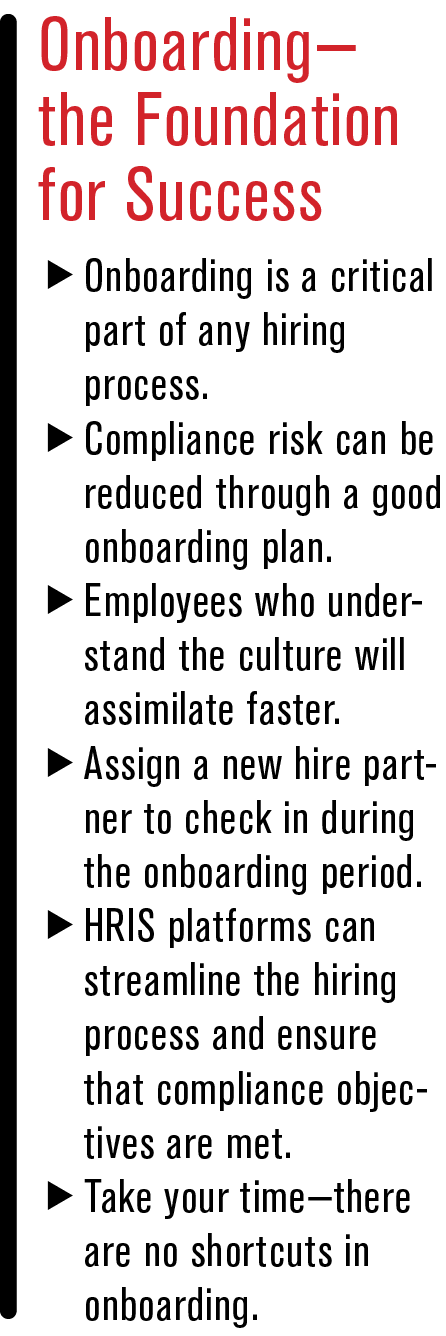By Lisa Marshall
Building a strong workforce begins with onboarding. What many organizations overlook is that the employee onboarding process starts before a new hire enters the door of your organization.
A smooth and thorough orientation to your organization and culture is important to create a smooth transition for your new hire. A documented transition plan will assure the organization that you have met all compliance requirements for your new hire while simultaneously decreasing employee turnover and fostering a positive work experience.
To be sure you have a compliant onboarding process, here are three key objectives that should be included in your onboarding plan to ensure that your new hire has the support and resources to succeed.
Objective 1: Foundation Matters
Do not delay! Make sure your new hire’s legal paperwork is handled on the first day. The majority of HR compliance forms that are required for new hires must be completed within the first few days of their start date. Some of these legal documents include:
- W-2s
- I-9s
- Employee Payroll Setup Forms
- NDAs
- Employee Handbook
- Benefits Enrollment
Completing and processing these legal forms are a must-do step on your hire’s first day. This step not only protects your organization from various risks, but ensures that your new hire is prepared for a successful first week and reduces any confusion or delays caused by paperwork being processed late.
Recommendation: A great way to streamline all the legal paperwork is to implement an HR onboarding platform into your organization. If you are unsure how to find a system or need assistance with identifying the required paperwork for your state/local region, RRC Broker Solution Consultants are available to help you align your needs with the systems and forms required to get compliant and stay there.
Objective 2: Set the Standard
 Company culture means something different to every organization. However, there is one thing that remains constant for every employee hired: If a new hire does not respect or support the company culture, they will not be successful.
Company culture means something different to every organization. However, there is one thing that remains constant for every employee hired: If a new hire does not respect or support the company culture, they will not be successful.
A well-defined onboarding process creates an opportunity for the hiring manager to provide a brief history of the organization, review the leadership of the organization and go in-depth with the new hire about the roots of the organization and the unique culture in which they are now a part.
We call these meetings culture briefings, and they give your new team member the opportunity to connect to the organization’s mission, vision and core values. Building that connection early in the new member’s employment will help them connect to the organization.
Recommendation: During the onboarding period, assign your new hire a buddy or mentor who will work closely with your new hire and help them navigate through onboarding, check in with them daily and report any concerns to the supervisor/manager. A mentor/buddy helps the organization respond to concerns and issues in a timely manner rather than waiting until the full onboarding process has been completed. If serious concerns are raised during the onboarding period, do not wait to respond. The key to new employee success is not letting your new hire go without the support and resources they need during the onboarding process.
Objective 3: Service Over Speed
The hiring market has experienced permanent change since COVID-19. These changes have created new challenges for almost all industries during the hiring process. Now, more than ever, organizations may feel tempted to take the shortcut of training an employee quickly. Do not fall victim to that temptation. The average onboarding plan should take up to 90 days and be accompanied with clear expectations and goals. Do not rush through training. Make sure that your new hire understands how to do their job, and create key milestones for their success as they evolve during their onboarding.
Recommendation: Take your time and be patient during the onboarding process. Ensure that your new hire has everything they need to do their job, and do not let the need to fill the position force you to miss important steps throughout the process that can lead to employee and organizational success.
RRC Broker Solution Consultants are available to help you align your needs with the systems and forms required to get compliant and stay there. You can contact an HR consultant at CRS.com/broker-solutions.
Photo: iStock.com/metamorworks








